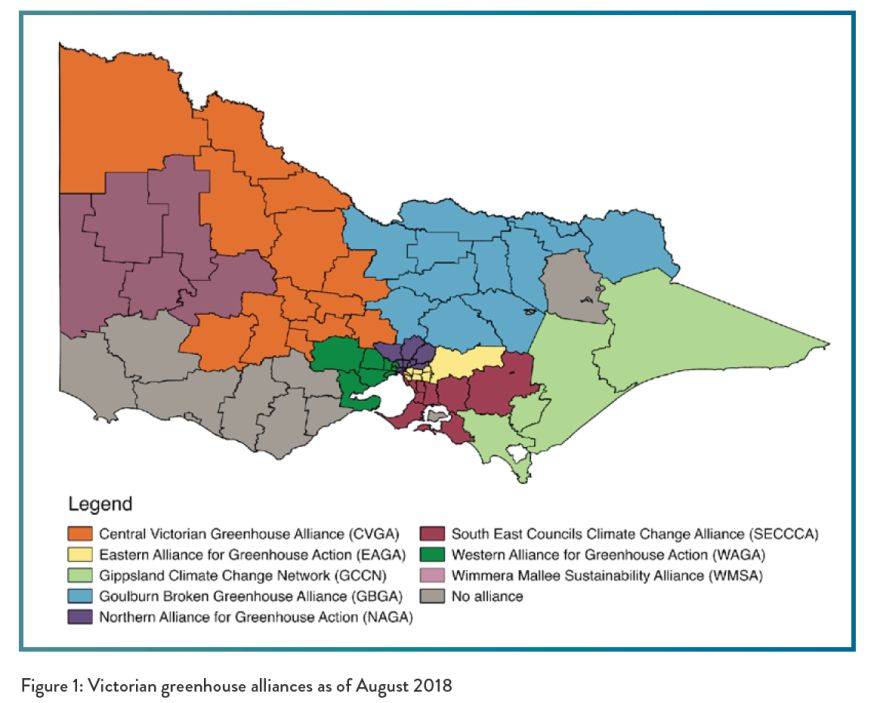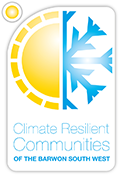Barwon South West Climate Resilient Communities Alliance
Background
Since 2012 the Barwon South West region has benefited from the work of the Climate Resilient Communities (CRC) project in planning for and adapting to climate change. The region has achieved greater preparedness and increased resilience in our communities as a result of this proactive collaboration among 10 Councils, the Department of Environment, Land, Water and Planning, two catchment management authorities and local water authorities, among others.
A wide range of initiatives was undertaken by the CRC project, including the delivery of adaptation plans to all councils within the region, as well as beginning the process of implementing priority actions identified in the plans and embedding the learning within each organisation.
A signature knowledge-sharing event, the Barwon South West Climate Change Forum, was held in December 2017 to showcase the important work being done across the region in both adaptation and mitigation and to celebrate the successes of the CRC project itself, as it drew to a close. With the project now complete, there is an opportunity to formalise the strong network that has developed across the region and to continue to support climate resilience at the community level facilitated by local government and state agencies.
Proposed Regional Cooperation
We hope to continue to build on the momentum the Climate Resilient Communities project achieved and the strong regional network that formed through the project by establishing a formal cooperative arrangement. Suggestions for identifying this cooperation largely build upon the legacy of the Climate Resilient Communities Project and so it is tentatively titled the Climate Resilient Communities Alliance (CRCA).

Currently the Barwon South West region is the only region of Victoria without a formal greenhouse or climate action network targeted at the local government sector and state agencies. It is clear from the experience of alliances around Victoria, some of which have been in existence for almost 20 years, that there is much to gain from collaboration within and between alliances. Greenhouse and climate alliances are capable of delivering significant benefit to the community through reducing greenhouse impacts, building resilience, responding to climate challenges, as well as enabling cost savings, knowledge sharing, access to grant funding, increased advocacy and environmental benefits. Indeed Victorian regional alliances have seen a return on investment (ROI) in recent years that has been in the order of between 1:4 (EAGA) and 1:9 (CVGA).
Greenhouse alliances operating across Victorian councils undertake 3 core functions:
- Projects – Develop and implement innovative regional strategies and projects typically beyond the reach of individual member organisations
- Advocacy – Advocate on behalf of the community and member organisations
- Knowledge Sharing – Undertake a range of knowledge sharing & capacity building activities
Detailed information on current Victorian greenhouse alliances is available at: http://www.victoriangreenhousealliances.org
A Barwon South West collaboration could mirror these functions and activities; it could also continue the important work of building community resilience to climate change while investing in renewables, decarbonising the economy, adapting to climate change, investing in green infrastructure and supporting greater sustainability at the local and regional level.
Governance and Financial Structure
Models of membership, staffing and governance need to be discussed, however the experience of other Victorian alliances indicates that in the establishment phase a Climate Resilient Communities Alliance should aim to fund a regional coordinator for 3–4 days per week, potentially hosted at one of the member organisations.
Structurally, the alliance could consist of an executive committee and a working group to guide priority projects and advocacy work.
Annual membership fees could be proportional to member organisation size and capacity, and would likely be $8,000–$16,000. Annual fees may also vary depending on external funding the alliance is able to attract. It may also be possible to establish full membership and associate membership arrangements.
The alliance could also establish special relationships with partner and supporter organisations, and it would work to identify links to other regional players and networks in the climate change space.
Proposed Member Councils
- Borough of Queenscliffe
- City of Greater Geelong
- Colac Otway Shire Council
- Corangamite Shire Council
- Glenelg Shire Council
- Golden Plains Shire Council
- Moyne Shire Council
- Southern Grampians Shire Council
- Surf Coast Shire Council
- Warrnambool City Council
Other Proposed Member Organisations
- Barwon Water
- Corangamite Catchment Management Authority
- Department of Environment, Land, Water & Planning
- Glenelg-Hopkins Catchment Management Authority
- South West Healthcare
- Wannon Water
Priority Projects
The following is a list of some potential priority projects the CRCA could work towards implementing in its early phase:
Adaptive Capacity-Building – coordinate and deliver actions that support climate change resilience building, with a range of projects focussing on:
- Human health and well being
- Vulnerable communities
- Agriculture sector
Electric Vehicles – investigate charging infrastructure, fleet purchasing and emissions savings
Emergency Management – projects to assist with community resilience to extreme weather events and contribute to region-wide emergency management planning
Energy Monitoring and Reporting Systems – investigate establishing a region-wide approach to corporate energy monitoring and reporting as an important part of working towards consumption reduction
Integrated Water Management Framework – improved water management processes taking a catchment-wide approach
Large Scale Renewables and/or Power Purchase Agreements – leverage region-wide opportunities to establish large scale renewables and/or power purchase agreements
Local Coastal Hazard Assessments – coordinate local coastal hazard assessments to be undertaken across the region and assist Councils to explore opportunities to embed results into planning scheme
National Resource Management – projects to improve the management of natural resources, including grasslands, forests and sensitive coastal areas
Street Lighting – upgrade street lights across the region to LED, providing significant cost savings and emissions reductions
Solar PV – solar and battery bulk-buy programs for domestic systems and community organisations providing energy security and environmental benefits
Feedback Sought
As we are in the early stages of canvassing opinions and suggestions for a formal alliance for the Barwon South West region, we seek your feedback on behalf of your organisation on the ideas outlined above and the likely interest of your organisation in participating.
Please respond by completing the feedback form below by COB on Monday, 18 February 2019.
If you would like to make suggestions or comments that are beyond the scope of the form, please email these within the same timeframe to Stewart Anderson, Manager Environment & Community Safety at Colac Otway Shire Council (stewart.anderson@colacotway.vic.gov.au).








